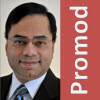 by Promod Sharma, CC
by Promod Sharma, CCTEDx events are an opportunity to see great local speakers.
TEDxToronto took place this week. Over 1,000 attended. Imagine speaking to an audience that size. This polished event provided lessons for Toastmasters and other speakers. We’ll look at the importance of mentors, timing and delivery.
Get A Mentor
Speakers vary in skill. They have different issues in their heads. To help them and maintain the standards of TEDxToronto, each speaker got coaching.The bigger issue may be honing the content. Speakers know much more than they have time to tell. If they’re used to presenting for an hour, trimming down to 18 minutes (or less) may be daunting. How can any of your golden words be omitted?
A mentor gives a valuable outside perspective and a reminder that the speaker is there for the audience. The problem is that a mentor is still one person and opinions vary.
“Only say what you think is funny. Only keep what they think is funny.”Another approach is to field test content in front of live audiences to gauge reactions. You want to get feedback from the right group. A Toastmasters club is ideal since members know how to give useful feedback. I sometimes use a printed form (preserves anonymity) or have a group discussion (for interaction and elaboration).
— BJ Kovak, Crafting a Joke: The Arc of an Act (Wired, May 2010)
Nail The Timing
In Toastmasters, we learn the importance of every second. We also learn that a second varies in length. A typical speech is 5-7 minutes. We may aim for six minutes during practice only to find that when we're live we speak faster, speak slower or add impromptu segments.To keep on track, we use lights at Toastmasters
- green at 5 minutes: you met the minimum requirements
- amber at 6 minutes: start winding down, even if you're behind
- red at 7 minutes: you've gone too long (you never want to see red)
If you’re speaking somewhere on your own, looking at your watch isn’t a good idea. An organizer can signal you. There are also timing apps for smartphones and tablets. Some clickers have timers and buzzers.
Be Flexible During The Delivery
“There’s a point where we must just open our mouths and let our voice come out. We let it mix in the air and accept that we can’t put it back.”
— Steven Page
You can practice and practice but the live experience is unpredictable.
At TEDxToronto, the speeches were generally delivered well. A child spoke but was hard to hear (was her headset microphone too far away?). When the hosts (MCs) started speaking between talks, they were sometimes hard to hear (seemed that their handheld mics were off or not amplified enough). Luckily audiences are forgiving and compensate for us.
There are bound to be TEDx events near you. If not, you can watch the videos on TED.com or a TEDx site like TEDxToronto.
Links
- How TEDxToronto speakers prepare for their big moment (Toronto Star, Oct 24, 2012)
- How TEDxToronto has changed (Riscario Insider, Oct 27, 2012)
- TED vs TEDx vs TEDxToronto (Riscario Insider, Oct 2010)
- Make your presentation better than a TED Talk (Marketing Actuary, Feb 2012)
- Do you stay up late the night before your presentation?
- Always use a wireless clicker for presentations
- What goes wrong when presenting outside your club
- Why a Master of Ceremonies (MC) matters?
- Get feedback from the right group
- How to prepare a speech on your iPad
Promod Sharma was President of Goodyear Toastmasters during the 2011-2012 year. He speaks primarily about building trust today.













 by Promod Sharma, President 2011-2012
by Promod Sharma, President 2011-2012


